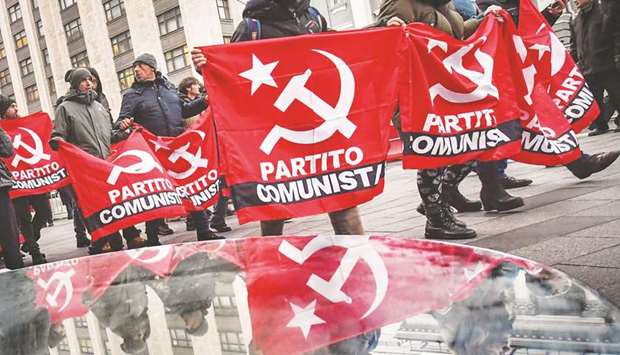Yesterday marked the 100th anniversary of the beginning of the revolution that established the Soviet Union, but you’d be hard-pressed to find an event in Russia to celebrate the occasion.
A military parade was held on Red Square and attended by more than 7,000 people, Russia’s official newspaper of record, Rossiiskaya Gazeta, reported.
But the parade was not dedicated to the revolution.
It was instead dedicated to an event during World War II in 1941 when tens of thousands of soldiers marched out from the Russian capital’s iconic square to fight invading Nazi forces on the outskirts of the city.
The newspaper did not mention in its description of yesterday’s parade that the original event was held in honour of the anniversary of the Soviet revolution.
“For most Russians, the World War II victory remains the most important event of the 20th century,” political analyst Maria Snegovaya told DPA.
The revolution’s significance has been downplayed since the Soviet era.
Concerned with maintaining stability, the Soviet government took steps to mute the anniversary celebrations.
The anniversary was substituted with Victory Day as the key foundational event of a new era, Snegovaya said.
There was at least one group that did plan to mark the revolution’s anniversary yesterday: Russia’s Communist Party.
Still a major political force in the country though significantly sidelined by the ruling United Russia party, the Communists held a rally attended by several thousand in central Moscow.
Party leader Gennady Zyuganov said representatives from 80 countries participated.
Numerous rally-goers held up portraits of Soviet leaders Vladimir Lenin and Josef Stalin.
According to preparations for the rally, it appeared to be more of a protest than a celebration of an event integral to the Communist Party’s existence.
An announcement on the party’s website informed prospective rally-goers to adopt the official slogans at the event, the first of which was: “Long live the socialist revolution!”
In the mid-1990s, the revolution’s anniversary was renamed as the Day of Accord and Reconciliation.
A decade later, that was sidelined by a new holiday, National Unity Day, celebrated three days earlier.
Most Russians no longer have a day off on the revolution’s anniversary.
“The move of the main national holiday from November 7 to November 4 was an attempt to get rid of the revolution,” said Ivan Kurilla, a professor of history and international relations at the European University in St Petersburg.
A survey last year by Russia’s largest independent pollster, the Levada Centre, revealed that only about half of the Russian populace knew the name of the holiday celebrated on November 4.

Demonstrators carrying red flags attend a rally in downtown Moscow marking the 100th anniversary of the 1917 Bolshevik revolution.
